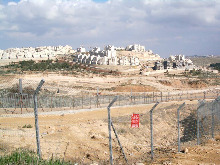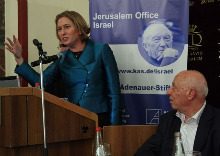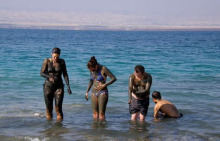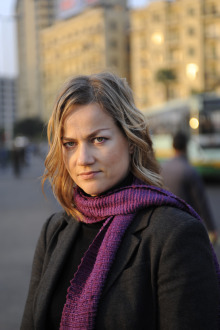Matt Rees's Blog, page 23
July 23, 2010
Israeli settlements: frozen, still cooking
 JERUSALEM — Palestinian negotiators said again this week they’d refuse to re-enter direct peace talks with Israel unless the current partial freeze on construction in Israeli settlements is extended when its term runs out in September.
JERUSALEM — Palestinian negotiators said again this week they’d refuse to re-enter direct peace talks with Israel unless the current partial freeze on construction in Israeli settlements is extended when its term runs out in September.But as a report released this week by the Israeli human-rights organization B’Tselem reveals, a real settlement freeze would have to be a very, very big chill.
B’Tselem’s report, called “By Hook or By Crook: Israeli Settlement Policy in the West Bank,” documents the massive scope of Israel’s settlement operation. It says that hundreds of millions of dollars are being paid to settlers, real estate developers and settlement municipalities as incentives to expand the settlements. It also highlights the manner in which every layer of Israeli bureaucracy continues to be involved in an expansion project that successive Israeli governments have pledged in international forums to halt.
For the human rights group, the issue is not political. Jessica Montell, B’Tselem’s executive director, said that the inequality of life in the West Bank — rather good if you’re an Israeli and pretty bad if you’re Palestinian — is the most objectionable upshot of the settlements, which she adds are illegal under international law.
“In the West Bank, your rights are based on your nationality,” she said.
Read the rest of this post on my blog The Man of Twists and Turns.
Published on July 23, 2010 22:03
•
Tags:
b-tselem, benjamin-netanyahu, east-jerusalem, george-w-bush, human-rights, israel, israeli, jessica-montell, middle-east, palestine, palestinian, road-map, settlement-freeze, settlements, tel-aviv, west-bank
July 22, 2010
Signing up
 A book takes a long time to write, and then it takes a while to sell. And another while to sell in another country, and another after that. So a writer’s smile spreads across time.
A book takes a long time to write, and then it takes a while to sell. And another while to sell in another country, and another after that. So a writer’s smile spreads across time.My long-term grin widened this weekend, when I signed with my UK publisher for my next two books. Not only because Atlantic, the excellent publisher which has brought out all four of my Palestinian crime novels, bought my next books. But because Atlantic is launching a very exciting new imprint called Corvus.
The new imprint is headed by Nicolas and Anthony Cheetham, a father and son team who made Quercus such an important imprint. They’ve taken on my next book MOZART’S LAST ARIA, which is already completed and being edited in New York by the delightful Claire Wachtel at HarperCollins, and the novel I’m currently writing, which has the working title CARAVAGGIO ON FIRE. It’s about the Italian artist who, incidentally, is thought to have died 400 years ago on Sunday.
Writers will know what I mean when I say that signing the contract is a wonderful marker, but also similar to many other things in a writer’s life – it seems like a big milestone, but no one’s around to witness it except you, so you have to go inside yourself to enjoy the moment.
Read the rest of this post on my blog The Man of Twists and Turns.
Published on July 22, 2010 02:10
•
Tags:
after-sex, anthony-cheetham, atlantic-books, brooke-shields, caravaggio, caravaggio-on-fire, claire-wachtel, contracts, corvus, crime-fiction, greece, harpercollins, historical-fiction, mozart, mozart-s-last-aria, nicolas-cheetham, palestine, publicity, publishing, the-collaborator-of-bethlehem, thomas-m-kostigen, writing
July 17, 2010
Tragic friends on a search for peace
 JERUSALEM—If you asked about a moment that encapsulates the tragedy of the Israelis and Palestinians, there’d be no shortage of incidents, fatal and wrathful, from which to choose. This week, however, I’d point out an occasion that was less shocking but just as poignant.
JERUSALEM—If you asked about a moment that encapsulates the tragedy of the Israelis and Palestinians, there’d be no shortage of incidents, fatal and wrathful, from which to choose. This week, however, I’d point out an occasion that was less shocking but just as poignant.In a banquet hall of the King David Hotel, an Israeli leader and a Palestinian leader came to the podium together Sunday evening. They embraced, spoke of each other as good friends and talked of the breakthroughs they made in the peace talks they shared. The audience applauded warmly and a benign smile made its way to the faces of almost everyone in the room.
Why is this a tragedy? Because former Israeli Foreign Minister Tzipi Livni and Ahmed Qurei, a member of the Palestine Liberation Organization’s Executive Committee, failed to make a peace deal.
The two were prime negotiators at regular meetings in the King David Hotel during 2007 and 2008 in what became known as the Annapolis Process — for a conference held in late 2007 at the U.S. Naval Academy in Annapolis, Maryland. The talks got even closer to a resolution of the conflict than the Camp David summit of 2000. In the end, Livni’s boss, Prime Minister Ehud Olmert, said that he made a wide-ranging offer to Palestinian President Mahmoud Abbas in 2008, never heard back and subsequently had to resign because of corruption investigations.
Since then talks have been at an impasse.
As Livni and Qurei reminisced affably about their near miss, I had two impressions. The first was that they had done a pretty good job of hiding how they really felt back when the negotiations were going on. Things in the region looked quite bad then. Israel fought a war with Hezbollah in Lebanon in 2006 and launched an attack on Hamas in Gaza at the end of 2008. Palestinians complained about building in Israeli settlements and, of course, fought a low-grade civil war between Hamas and Fatah.
The second important impression was that these two had really made a kind of personal peace. To differing degrees, they had gotten past the victimhood mentality that prevents either side from progressing. Yet they still hadn’t been able to hash out a deal, face to face across a table in a hotel (a very nice hotel, incidentally, where a basic room is $400 a night.)
In that case, what chance do peace talks now have?
Read the rest of this post on my blog The Man of Twists and Turns.
Published on July 17, 2010 09:56
•
Tags:
ahmed-qurei, annapolis-process, avigdor-lieberman, benjamin-netanyahu, ehud-olmert, fatah, gaza, hamas, hezbollah, intifada, israel, israelis, khalil-shikaki, king-david-hotel, lebanon, mahmoud-abbas, maryland, middle-east, palestine, palestinian, sarb-erekat, tzipi-livni, u-s-naval-academy
July 16, 2010
Read international crime fiction instead, World Cup fans
 World Cup fans, don’t fear hours of emptiness. Take up a work by an international crime fiction author. It’s the perfect replacement for your lost fix – and it’s a lot better for your soul, too.
World Cup fans, don’t fear hours of emptiness. Take up a work by an international crime fiction author. It’s the perfect replacement for your lost fix – and it’s a lot better for your soul, too.Here’s why. As the World Cup unfolded over the last month, newspapers all over the globe were filled with articles in which journalists extrapolated from aspects of the play and team-make up of various countries to draw lessons about the politics and sociology of those same nations.
Thus we learned that the Germans were successful not because their coach is a very smart tactician, but because they were multiethnic. We found that England’s loss was rooted in the shameless cash-fest of their football league, rather than the coach’s inability to counter German tactics and the evidence that the team’s players (who’re also pretty multiethnic) are simply a notch dumber than those of many other countries. Finally we thrilled to discover that there’s hope for the future of Spain, even if the country’s high court ruled this week that Catalans can’t refer to themselves as a “nation.” There were Catalans on the team that won in the final, the newspaper wrote, and so everything in Espana is /chévere/ (as the Spanish say when they’re feeling good) after all.
Naturally all this is the result of the feeble maneuvers of journalists and their need to come up with enough “theme” stories to keep editors from questioning the expense of sending a reporter to South Africa to write about things which are free on everybody’s television set.
The popularity of international crime fiction, however, has been in its ability to provide a window into a society in an entertaining format. Like football. Only real (even if it is fiction.)
Read the rest of this post on my blog The Man of Twists and Turns.
Published on July 16, 2010 03:19
•
Tags:
barcelona, bingo, catalans, crime-fiction, england, france, gaza, germans, iniesta, journalism, manuel-vazquez-montalban, middle-east, new-york-times, palestine, palestinian, roger-cohen, south-africa, spain, world-cup, xavi
July 15, 2010
The Barbara Cartland of Cairo…Sort of: Sanna Negus’s Writing Life interview
 Cairo is a place we all know to some degree, even if only the image of the pyramids and the Sphinx. A short visit there is enough to make you wonder about how much of this teeming metropolis you really don’t know. No writer gets so deep as Sanna Negus under the skin of this ancient city, which remains key to the future of the benighted Middle East. Sanna’s the Middle East correspondent for Finnish radio and television. Her new book “Hold onto Your Veil, Fatima! And Other Snapshots of Life in Contemporary Egypt” is a stunning portrayal of Egypt that’s both homage and expose. Pulitzer winner Lawrence Wright calls her “one of the most informed and well-connected reporters in the region.” She’s also one of the best writers. Here she talks about the decade she spent in Cairo (before moving to Jerusalem) and how she wrote her book.
Cairo is a place we all know to some degree, even if only the image of the pyramids and the Sphinx. A short visit there is enough to make you wonder about how much of this teeming metropolis you really don’t know. No writer gets so deep as Sanna Negus under the skin of this ancient city, which remains key to the future of the benighted Middle East. Sanna’s the Middle East correspondent for Finnish radio and television. Her new book “Hold onto Your Veil, Fatima! And Other Snapshots of Life in Contemporary Egypt” is a stunning portrayal of Egypt that’s both homage and expose. Pulitzer winner Lawrence Wright calls her “one of the most informed and well-connected reporters in the region.” She’s also one of the best writers. Here she talks about the decade she spent in Cairo (before moving to Jerusalem) and how she wrote her book.How long did it take you to get published?
The initial Finnish version (2005) came out quite smoothly. I first got a writing grant from the biggest publishing house in Finland, WSOY, which allowed me to work on three sample chapters. Less than a year later we signed a contract. The English version took longer to publish, mainly because I got distracted by other things. One UK publishing house was at first interested, but then withdrew and I guess it depressed me and I buried the project for a while. After some friends kicked my behind and told me to get my act together, I took a look at my bookshelf’s Middle Eastern books. So I wrote to Garnet on Monday, they answered on Tuesday and on Friday I got a contract!
Would you recommend any books on writing?
This being my first book, I figured I should probably look into some writing guides. So I read a couple of books in Finnish. While these books gave a boost to my confidence, they still didn’t solve the problem of the blank page. When I was taking my first steps as a journalist (and I never studied journalism or literature), I found Jon Franklin’s Writing For Story useful. But at the end of the day, it’s better to read what other people have written in your genre.
What’s a typical writing day?
The morning starts with some form of exercise, followed by breakfast and several hours of futzing around (checking my email every five minutes, making yet another cup of coffee, doing laundry, going to a supermarket to buy a single item…) Typically I would do research or write down interviews during the day and write late into the night. My creative powers unfold after sunset.
Read the rest of this post on my blog The Man of Twists and Turns.
Published on July 15, 2010 03:17
•
Tags:
barbara-cartland, cairo, egypt, fear-and-loathing-in-las-vegas, finland, hunter-thompson, interviews, jerusalem, jon-franklin, michael-chabon, michel-houellebecq, middle-east, nonfiction-books, orhan-pamuk, salman-rushdie, sanna-negus, sofi-oksanen, stieg-larsson, the-writing-life, writing, writing-for-story
July 9, 2010
All talk, no two states

At his White House press conference with Israeli Prime Minister Benjamin Netanyahu this week, United States President Barack Obama enthused that the talks about talks will probably lead to talks, and his assessment was that the Israeli government is ready to take part in those talks.
As the camera shutters clicked and the Israeli prime minister cocked his eyebrow in the way he favors when trying to look smarter than everyone else in the room, the most powerful man in the room said: “We expect proximity talks to lead to direct talks, and I believe that the government of Israel is prepared to engage in such direct talks.”
If that sounds like a lot of nothing, that’s because underlying all the talking about talks there’s a growing sense that none of it will ever lead anywhere. Anywhere good that is. The talks are supposed to be about what’s known as the “two-state solution,” in which the land of Israel, the West Bank and Gaza is divided into a state for Israel and a state for the Palestinians.
More and more Israelis and Palestinians, however, acknowledge (or fear) that it’s too late to effectively divide the land as the Israeli and Palestinian populations grow and merge geographically. All the talking about talks and the climate of fear in both nations’ polities delays the chance of a final deal. That, in turn, allows changes on the ground to make a two-state solution still further away.
“The two-state solution is really not an option anymore,” said Gideon Levy, a columnist for the Israeli newspaper Ha’aretz and author of a new book of essays about the Palestinians called “The Punishment of Gaza.”
“It’s on its last legs,” he said.
Read the rest of this post on my blog The Man of Twists and Turns.
Published on July 09, 2010 06:40
•
Tags:
barack-obama, benjamin-netanyahu, gaza, gideon-levy, hamas, hebrew-university, israel, jews, mahmoud-abbas, palestinians, peace-talks, sergio-della-pergola, settlements, two-state-solution, united-states, west-bank
July 1, 2010
Murdering Holocaust-denier Engaged to Celine Dion Recovers Couches
 I’m taking my revenge on the deployers of banal Facebook updates. I’m writing a blog post about my new couches.
I’m taking my revenge on the deployers of banal Facebook updates. I’m writing a blog post about my new couches.Old couches recovered, actually. But I’ll get to that soon enough.
At first I had considered that I might avenge myself on the lame updaters by putting up a false Facebook status update of my own each day, attempting to see how long it would be before people caught on to the joke or simply had me removed from Facebook altogether. I thought it’d go something like this:
MATT REES is cleaning out tripes.
MATT REES is cleaning out his own tripes.
Read the rest of this post on my blog The Man of Twists and Turns.
Published on July 01, 2010 01:16
•
Tags:
ac-dc, celine-dion, dalai-lama, facebook, holocaust, mahmoud-ahmedinejad, matt-rees, twitter, world-cup, you-shook-me-all-night-long
June 27, 2010
What's floating in the Dead Sea?
 If you’ve ever slathered your skin in the healing, mineral-rich mud of the Dead Sea, you may want to stop reading now.
If you’ve ever slathered your skin in the healing, mineral-rich mud of the Dead Sea, you may want to stop reading now.More than 8 million gallons of sewage from East Jerusalem is pumped downhill to the Dead Sea, raw and untreated, every day. That’s not just a little icky for those of us who like to float in the lowest body of water on earth. It’s also an environmental catastrophe, and potentially another flashpoint in the conflict between Israelis and Palestinians.
“It’s the greatest environmental hazard in the country,” said Naomi Tzur, Jerusalem’s deputy mayor, who heads the planning and environmental committees on the city council. “I don’t sleep easily at night knowing that this is happening.”
The Dead Sea is one of the contenders to be named among the Seven Natural Wonders of the World in an online poll that organizers estimate will draw a billion voters by the time results are announced next year. But its location also puts it in the firing line of a conflict almost as bitter as the sea’s highly saline water.
Read the rest of this post at my blog The Man of Twists and Turns.
Published on June 27, 2010 08:08
•
Tags:
bustan, dead-sea, east-jerusalem, environment, germany, israel, kidron-valley, middle-east, palestinians, sewage
June 23, 2010
Soggy sheep at breakfast
 I was under the impression that the English weren’t allowed into Wales any more, now that Tony Blair persuaded us we ought to have at least half a government of our own and let Westminster pay for it. I assume Colin Cotterill managed to make it through the border undercover on his Australian passport. Which is a good thing, because his blog post of this week was a lovely appreciations of my homeland, even down to the 28 yards of daily rainfall for which I yearn as I swelter through 40-degree desert heat here in Jerusalem.
I was under the impression that the English weren’t allowed into Wales any more, now that Tony Blair persuaded us we ought to have at least half a government of our own and let Westminster pay for it. I assume Colin Cotterill managed to make it through the border undercover on his Australian passport. Which is a good thing, because his blog post of this week was a lovely appreciations of my homeland, even down to the 28 yards of daily rainfall for which I yearn as I swelter through 40-degree desert heat here in Jerusalem.During his stay at the Hay-on-Wye Book Festival, Colin muses that a soggy sheep would be less attractive than a dry one. A dry sheep may conjure up pleasanter images of romantic moments in the haybarn (in a land where there are more sheep than humans, romance might occasionally include a sheep.) There is, however, considerable lanolin in the sheep’s wool, so the rainfall doesn’t penetrate to the sheep’s body and therefore a good shake would be all that’s needed to dry him or her out – for further investigation, as it were.
I hope that clears things up for you, Colin. Next time you’re at the Hay festival, even if it’s raining, sheep are the perfect antidote. (Why do you think all those fat, boozed up London publishing types come all the way to the countryside?) Take this old Welsh joke as your cue:
A man walks into a pub. “Jones has been found having sex with a sheep,” he says. The barman looks up and asks, “Was it a male sheep or a female sheep?” “A female sheep, of course,” says the man. “There’s nothing wrong with Jones.”
Read the rest of this post at my blog
Published on June 23, 2010 07:53
•
Tags:
colin-cotterill, england, hay-book-festival, israel, jerusalem, london, publishing, sheep, ustralia, wales
June 20, 2010
How to keep up on the Middle East
 JERUSALEM — Time was anyone with an interest in the Middle East could be guaranteed a couple of books a year would be brought out by U.S. journalists based in the region. Now many of those correspondents are history, with news bureaus closing and those that remain cutting back. The new books written by Americans tend to be by think-tank types or others whose agenda is hard to figure out.
JERUSALEM — Time was anyone with an interest in the Middle East could be guaranteed a couple of books a year would be brought out by U.S. journalists based in the region. Now many of those correspondents are history, with news bureaus closing and those that remain cutting back. The new books written by Americans tend to be by think-tank types or others whose agenda is hard to figure out.But you know that already. It’s one reason you’re reading GlobalPost, which was founded partially to replace the disappearing corps of U.S. foreign correspondents. [That's where I first posted this.]
So GlobalPost has solved your journalism problem. But, still, what’re you going to do about the books? With a book written by a foreign correspondent you couldn’t always be sure of a good read —I’ve ploughed through some stinky “notebook dumps” in my time by reporters who padded pages with meaningless tales of their Palestinian and Israeli “friends” — but you at least knew that it was by a responsible journalist answerable to editors and readers even for his extracurricular writings. Not so with think-tank academics whose financing and agenda can make for deeply skewed accounts.
The answer: Europeans. A new book demonstrates what I’m talking about.
“Hold onto Your Veil, Fatima!” is an expose of contemporary Egypt that’s at once harrowing and humorous by Sanna Negus, a reporter for Finland’s YLE Radio and TV.
Negus came to the Middle East in the mid-1990s for graduate studies in Cairo, largely because she wanted to learn an unusual language and figured Arabic fit the bill. (It’s not as unusual as Finnish, but then she already had that covered.) She returned to Cairo, working for the English-language Cairo Times and staying for a decade as YLE’s correspondent. She’s been based in Jerusalem the last two years. (Lawrence Wright, who won a Pulitzer for “The Looming Tower: al-Qaeda and the Road to 9/11,” writes in the book’s foreword that Negus is “one of the most informed and well-connected reporters in the region.”)
Read the rest of this post on my blog The Man of Twists and Turns.
Published on June 20, 2010 03:16
•
Tags:
9-11, american-colony, cairo, cairo-times, crime-fiction, egypt, female-circumcision, finland, genital-mutilation, global-post, hold-onto-your-veil-fatima, israe, jerusalem, journalism, lawrence-wright, middle-east, middle-east-books, pulitzer-prize, sanna-negus, the-looming-tower, time-magazine, women



